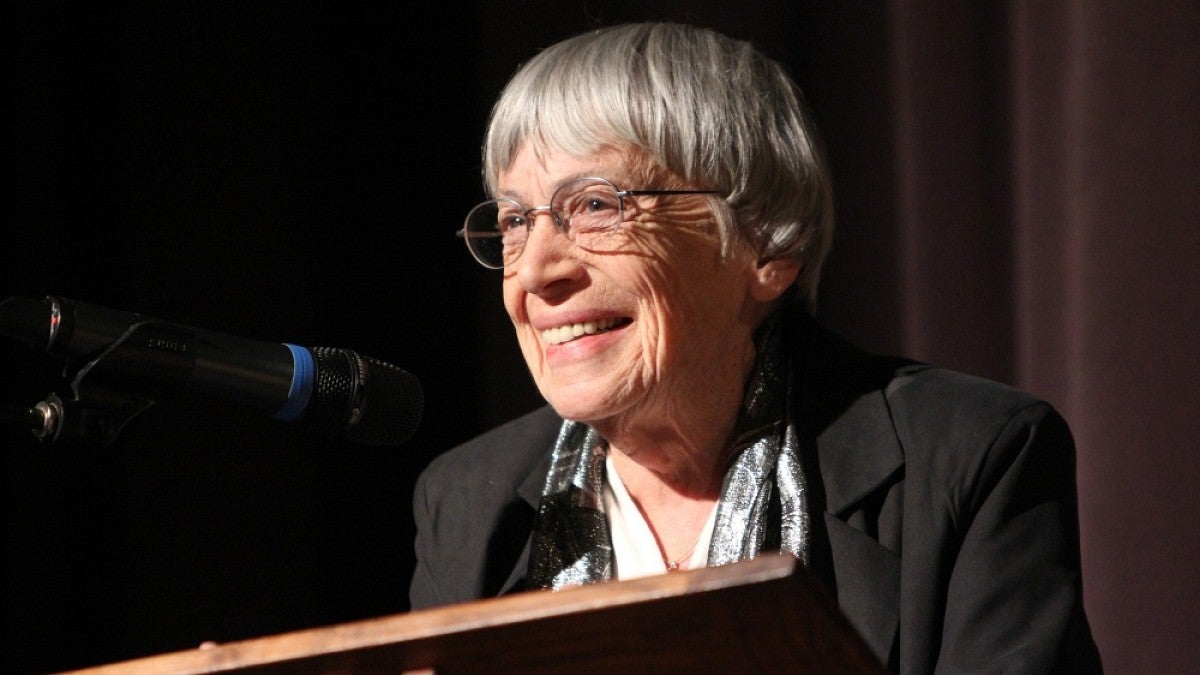World-renowned author Ursula K. Le Guin, who had a long association with the UO, died at her Portland home Monday, Jan. 22. She was 88 years old.
A Portland resident since 1959, Le Guin was a prolific poet, essayist, critic and translator in addition to her most famous work in the realms of speculative fiction. She combined perspectives from anthropology, feminism, science, history, utopian thought and Taoist philosophy wrapped up in narratives of exploration and self-discovery.
As news of her passing spread throughout the UO community on Tuesday afternoon, many shared their memories of the author and appreciation for her work through email and social media.
“I feel very privileged to have been able to spend even a brief time with Ursula over the last three years,” reflected Ben Saunders, professor of English. “She was amazing. A mind like a knife and a soul like the ocean. In these trying times, it can be something of a comfort just to know that the species can produce someone like her now and again.”
John Schmor, assistant professor of theatre arts, collaborated with Le Guin to adapt her award-winning novel “The Left Hand of Darkness” for the University Theatre stage. “I feel blessed to have had the chance to work with her, learn from her, laugh with her and share what I love about her novel with students and theater audiences.”
Critics have often found it difficult to classify her work. While some consider her writing to be science fiction or fantasy, the author herself discounted any narrow genre categorizations. She regarded writing as an act with moral resonance and was publicly outspoken in her advocacy of issues ranging from environmental stewardship to fairness and transparency in the bookselling industry. She also was heralded for her pioneering work in bringing nonwhite and nonstraight perspectives to speculative fiction.
Le Guin won every major award in the field of speculative literature, including multiple Hugo, Nebula, Locus, James Tiptree Jr. and World Fantasy awards. The Science Fiction and Fantasy Hall of Fame inducted her in 2001, and the Science Fiction and Fantasy Writers of America named her its 20th Grand Master in 2003.
Le Guin also received the Pushcart Prize, the PEN/Malamud Award and the National Book Award for Children’s Books. Her work also has been shortlisted for the National Book Award and the Pulitzer Prize.
In 2000 the U.S. Library of Congress named her a Living Legend for her significant contributions to America’s cultural heritage. In 2014, Le Guin was awarded the Medal for Distinguished Contribution to American Letters by the National Book Foundation.
The UO Libraries holds her papers in its special collections.
“Feminist science fiction is exceptionally well represented in our holdings of primary source materials,” said Linda Long, the UO's manuscripts librarian, who knew and collaborated with Le Guin for more than 20 years. “Since she first began depositing her materials in our special collections in 1980, Ursula’s papers have been a major cornerstone in our developing those collections.”
Adriene Lim, dean of libraries and Philip H. Knight Chair added: “I know that I speak not only for myself but for many of my library colleagues in saying that we were very saddened to learn of Ursula’s passing. She was a staunch advocate for fellow women writers, a champion of social and environmental justice, and a leading light for all readers who love imaginative literature. This is a sad day, yet we in the UO Libraries find some comfort in knowing that we will honor one of her heartfelt wishes by preserving her extraordinary legacy and keeping it accessible to scholars and fans for posterity.”
For more on Le Guin’s legacy and connection to the UO, see:
“From Darkness Into Stage Light,” an in-depth look at the adaptation of one of her most celebrated works by Oregon Theatre.
Watch video of talks and sessions from the 2016 Tiptree Symposium, dedicated to the life and work of Ursula K. Le Guin.
The Le Guin Feminist Science Fiction Fellowship is awarded annually by UO Libraries and the Center for the Study of Women in Society.


